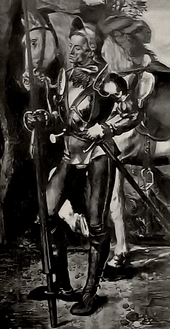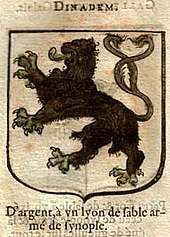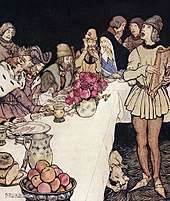Dinadan
Sir Dinadan (Dinadam, Dinadano, Dinadeira, Divdan, Dynadan) is a Knight of the Round Table in the Arthurian legend's chivalric romance tradition, appearing in the Prose Tristan and its adaptations including the later part of Le Morte d'Arthur. Best known for his humor and pragmatism, Dinadan is a close friend of the protagonist Tristan.

In medieval literature

Alike Palamedes and Lamorak, Dinadan was an invention of the Prose Tristan (a variant of the legend of Tristan and Iseult), and appeared in later retellings including the Post-Vulgate Cycle and Thomas Malory's Le Morte d'Arthur. He is the son of Brunor senior (the Good Knight without Fear), a brother of his fellow Knights of the Round Table, Breunor le Noir and Daniel. Unlike most other knights in Arthurian romance, the practically-minded Dinadan prefers to avoid fights and considers courtly love a waste of time, though he is a brave fighter when he needs to be.

Dinadan is well known for his cynical humor and joking nature, and for his mockery of chivalry.[1] In Le Morte d'Arthur, he is visiting the court of Cornwall seeking his friend, the young hero Tristram (Tristan), and has supper with Queen La Beale Isoud (Iseult) where he reveals that he has, by his own desire, no lady-love or paramour in whose name to do great deeds. Dinadan is also often portrayed as the wittiest of all of Arthur's knights, and a source and target of practical jokes. In Le Morte d'Arthur, he is one of the few knights to be able to recognise his fellows from their faces in addition to their shields; in one instance Tristan does not recognise his own King until Dinadan tells him who it is. In one notable exploit, he writes an insulting ballad about King Mark and sends a troubador to play it at Mark's court. In another episode, he loses a joust when Lancelot catches him off guard by wearing a dress over his armour; Lancelot then puts the dress on his unconscious opponent.
As summarized by to Joyce Coleman, "Margaret Schlauch hails the 'courtly realism' of Sir Thomas Malory's Morte Darthur and, in particular, 'the comically realistic Sir Dinadan', whose jokes about his fear of jousting have his listeners laughing so hard they can barely keep their seats. 'Sir Dinadan, the realist' (Elizabeth Edwards), the 'rational moralist' ruled by a 'pragmatic creed' (Donald Hoffman), remains a standard figure of Malorian analysis."[2] However, some like Eugene Vinaver and Harold Livermore regard the humor of Malory's Dinadan as inferior to that of the French original in which Dinadan's jokes are more offensive and subversive (targeting even religion).[3]
In Le Morte d'Arthur, following the Prose Tristan narrative, Dinadan dies when he returns from Cornwall, hoping to persuade King Arthur to reverse his ruling which had again set Mark on the throne. However Dinadan, still wounded from his fight with Brehu the Merciless, is treacherously ambushed and murdered by two other Round Table knights, the brothers Mordred and Agravain, who hated him due to his closeness to their enemy Lamorak from the rival clan of King Pellinore. Hector finds Dinadan mortally wounded and takes him to Camelot, where he dies in Lancelot's arms.
In the Italian Tavola Ritonda, Dinadan (Dinadano) himself attempts to murder the captured Marco in revenge for the death of Tristano, and Breus sanz Pietà is actually his cousin. This version of Dinadan is characterized differently, as a violent misogynist who hates Tristano's beloved Isotta as "a whore".[4][5] Dinadan also appears in some other romances, such as in Escanor, where his strong distrust of women is a theme of comedy,[6] and in some variants of the Prophecies de Merlin.
In modern fiction
Dinadan's modern appearances included the stage version and film adaptation of the musical Camelot, portrayed by John Cullum, Christopher Sieber, and (in the film) Anthony Rogers. He is protagonist of Gerald Morris' 2003 novel The Ballad of Sir Dinadan[7] as well as subject of the chapter "Sir Dinadan the Humorist" in Mark Twain's 1890 A Connecticut Yankee in King Arthur's Court.[8]
See also
- Dagonet, King Arthur's court jester
- Sancho Panza
References
- Rovang, Paul (2014). Malory's Anatomy of Chivalry: Characterization in the Morte Darthur. Rowman & Littlefield. ISBN 9781611477795.
- "Arthurian Literature XXIII on JSTOR". Cite journal requires
|journal=(help) - Glowka, Arthur Wayne (1986). "MALORY'S SENSE OF HUMOR". Arthurian Interpretations. 1 (1): 39–46 – via JSTOR.
- "Arthurian Literature XIX: Comedy in Arthurian Literature on JSTOR". Cite journal requires
|journal=(help) - Larrington, Carolyne (1 February 2004). "04.02.30, Busby, Dalrymple, eds., Arthurian Literature XIX". The Medieval Review. ISSN 1096-746X. Retrieved 30 July 2020.
- Brook, Leslie. "Demons and Angels: Female Portrayal in Escanor". www.reading.ac.uk. Retrieved 30 July 2020.
- Morris, Gerald (2008). The Ballad of Sir Dinadan. Houghton Mifflin Harcourt. ISBN 9780547349848.
- "Chapter 4: "Sir Dinadan the Humorist" | A Connecticut Yankee In King Arthur's Court | Mark Twain". etc.usf.edu. Retrieved 21 February 2019.